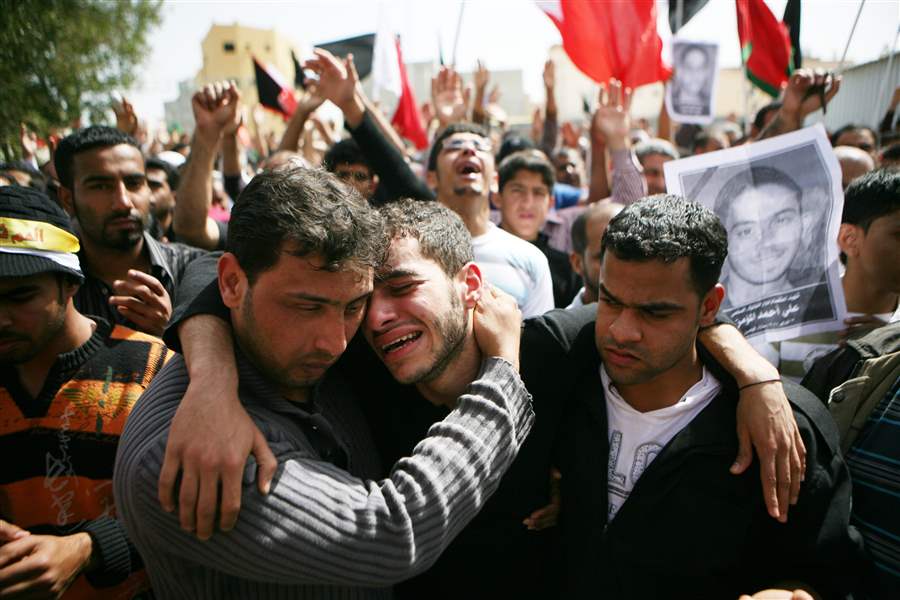
Forces in Bahrain, Yemen fire on citizens
Crown prince appeals for calm, offers talks
2/18/2011
Family members mourn during a funeral in Sitra, Bahrain, for a slain anti-government protester.
GETTY IMAGES

Protesters pray in the streets of Pearl Square in Manama, capital of Bahrain, and the scene of clashes with government forces. Protesters have turned defiant against the entire ruling system after the brutal crackdown there.
In Bahrain, security forces wounded at least 50 people when thousands defied the government and marched toward Pearl Square in a growing effort to bring down the whole ruling monarchy.
"This is a war," said Dr. Bassem Deif, an orthopedic surgeon examining the wounded with bullet-shattered bones.
In Washington, President Obama criticized the use of violence in Bahrain, as well as in Libya and Yemen, where heavy crackdowns by old-guard regimes were reported. "The United States condemns the use of violence by governments against peaceful protesters in those countries, and wherever else it may occur," Mr. Obama said. "The United States urges the governments of Bahrain, Libya, and Yemen to show restraint in responding to peaceful protests and to respect the rights of their people."
In Libya, soldiers sought to crush unrest, and in Yemen at least four protesters were killed in clashes between security forces and pro-government loyalists and crowds demanding an end to President Ali Abdullah Saleh's 32-year rule.
On a day when clashes erupted across the region, the response from security forces was most heavy-handed in tiny Bahrain, home to the U.S. 5th Fleet, where soldiers used armored personnel carriers and machine guns to fire on protesters.
There were conflicting accounts of the clashes.
Some witnesses said the military fired from helicopters or sniper's nests as well as from armored personnel carriers equipped with machine guns. The riot police then fired tear gas, the witnesses said, sending victims rushing to the city's public hospital, which was overwhelmed by the wounded.
The United States last year provided Bahrain with about $21 million in military assistance, a substantial amount given the country's relatively small size. Of that total, about $1 million was designated for counterterrorism aid, much of it to the police and military forces that are suppressing the protests in the country's capital.
Bahrain's king tried to restore calm by appointing his son, the crown prince, to lead a dialogue with anti-government demonstrators, most of them Shiite Muslims, who are demanding greater representation and other democratic reforms in a country where most power is wielded by the Sunni minority.
Bahrain's crown prince, Salman bin Hamad al-Khalifa, made an unexpected appearance on a talk show on state television last night to appeal for calm and to invite the opposition to talks.
"I gave my message to the people, to everyone, to withdraw from the streets and calm down. We will all reach a joint point of view," he said, inviting the opposition's leaders to meet with him today to discuss their grievances.
The crown prince expressed condolences for "these painful days" and called for unity.
"We are at a crossroads," he said. "Youths are going out on the street believing that they have no future in the country, while others are going out to express their love and loyalty. But this country is for you all, for the Shiites and Sunnis."
The cries against King Hamad bin Isa al-Khalifa and his inner circle reflect a sharp escalation of the political uprising.
The mood, however, has turned toward defiance of the entire ruling system after the brutal crackdown in Pearl Square, which put the nation on an emergency-style footing with military forces in key areas and checkpoints on main roads.

Family members mourn during a funeral in Sitra, Bahrain, for a slain anti-government protester.
In Yemen, anti-government demonstrators clashed with supporters of Yemen's longtime ruler and riot police, who fired tear gas and gunshots to disperse the crowd.
Three people were killed by police in the port of Aden and 48 were wounded in the southern city of Taiz when someone threw what appeared to be a grenade into a crowd.
It was the ninth straight day of protests in Yemen.
Demonstrators are calling for the ouster of President Ali Abdullah Saleh, a key U.S. ally in fighting al-Qaeda terrorists.
In Jordan's capital of Amman, clashes broke out between government supporters and opponents at a protest calling for more freedom and lower food prices, injuring eight people in the first reported violence in weeks of demonstrations.
It was the seventh straight Friday that Jordanians, inspired by uprisings in Tunisia and Egypt, took to the streets to demand more say in decision-making.
Tunisia's transitional government approved a general amnesty of the country's political prisoners, the prime minister said. The move is likely to free those convicted under tough anti-terrorism laws.